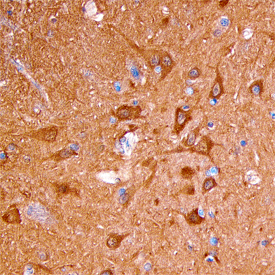Human Neurocan Antibody Summary
Glu23-Cys1321
Accession # O14594
Applications
Please Note: Optimal dilutions should be determined by each laboratory for each application. General Protocols are available in the Technical Information section on our website.
Scientific Data
 View Larger
View Larger
Neurocan in Human Brain. Neurocan was detected in immersion fixed paraffin-embedded sections of human brain using Sheep Anti-Human Neurocan Antigen Affinity-purified Polyclonal Antibody (Catalog # AF6508) at 1.7 µg/mL overnight at 4 °C. Tissue was stained using the Anti-Sheep HRP-DAB Cell & Tissue Staining Kit (brown; Catalog # CTS019) and counter-stained with hematoxylin (blue). Specific staining was localized to the cytoplasm of neurons. View our protocol for Chromogenic IHC Staining of Paraffin-embedded Tissue Sections.
Reconstitution Calculator
Preparation and Storage
- 12 months from date of receipt, -20 to -70 °C as supplied.
- 1 month, 2 to 8 °C under sterile conditions after reconstitution.
- 6 months, -20 to -70 °C under sterile conditions after reconstitution.
Background: Neurocan
Neurocan, also known as CSPG3 and 1D1, is a secreted chondroitin sulfate proteoglycan that is primarily expressed in the central nervous system (1). Human Neurocan contains one Ig-like V-type domain, two Link domains, two EGF-like domains, one C‑type lectin-like domain, and one Sushi domain (2). It is an approximately 300 kDa molecule of which 66 kDa is chondroitin sulfate and 60 kDa is N‑ and O‑linked glycosylation (3). Mature human Neurocan shares 66% aa sequence identity with mature mouse and rat Neurocan. Human Neurocan is predicted to be cleaved following Met635, resulting in N-terminal (Neurocan-130) and C‑terminal (Neurocan-C) fragments whose core glycoproteins are 130 kDa and 150 kDa, respectively (4, 5). The full length molecule is expressed in the developing and juvenile brain, while its cleavage products are found throughout adulthood (3, 4). Neurocan and Neurocan-C are produced by astrocytes and accumulate in the matrix surrounding axonal bundles and neuronal cell bodies; Neurocan-130 is found mainly in the glial cell cytoplasm (6-8). Following brain injury, reactive astrocytes deposit increased amounts of Neurocan in the glial scar where it impedes axonal regeneration (6, 9). Neurocan inhibits neuronal adhesion and neurite outgrowth through interactions with a variety of matrix and transmembrane molecules including NCAM-L1, NCAM-1, Syndecan-3, Glypican-1, Tenascin, Contactin-2/TAG1, and HAPLN1 (1, 6, 10-15).
- Rauch, U. et al. (2001) Cell. Mol. Life Sci. 58:1842.
- Prange, C.K. et al. (1998) Gene 221:199.
- Rauch, U. et al. (1991) J. Biol. Chem. 266:14785.
- Matsui, F. et al. (1994) Neurochem. Int. 25:425.
- Rauch, U. et al. (1992) J. Biol. Chem. 267:19536.
- Asher, R.A. et al. (2000) J. Neurosci. 20:2427.
- Matsui, F. et al. (1998) Brain Res. 790:45.
- Abaskharoun, M. et al. (2010) Brain Res. 1327:6.
- Shen, L.H. et al. (2008) Glia 56:1747.
- Friedlander, D.R. et al. (1994) J. Cell Biol. 125:669.
- Sango, K. et al. (2003) Exp. Neurol. 182:1.
- Akita, K. et al. (2004) Biochem. J. 383:129.
- Grumet, M. et al. (1994) J. Biol. Chem. 269:12142.
- Milev, P. et al. (1996) J. Biol. Chem. 271:15716.
- Rauch, U. et al. (2004) Matrix Biol. 22:629.
Product Datasheets
FAQs
No product specific FAQs exist for this product, however you may
View all Antibody FAQsReviews for Human Neurocan Antibody
There are currently no reviews for this product. Be the first to review Human Neurocan Antibody and earn rewards!
Have you used Human Neurocan Antibody?
Submit a review and receive an Amazon gift card.
$25/€18/£15/$25CAN/¥75 Yuan/¥1250 Yen for a review with an image
$10/€7/£6/$10 CAD/¥70 Yuan/¥1110 Yen for a review without an image

